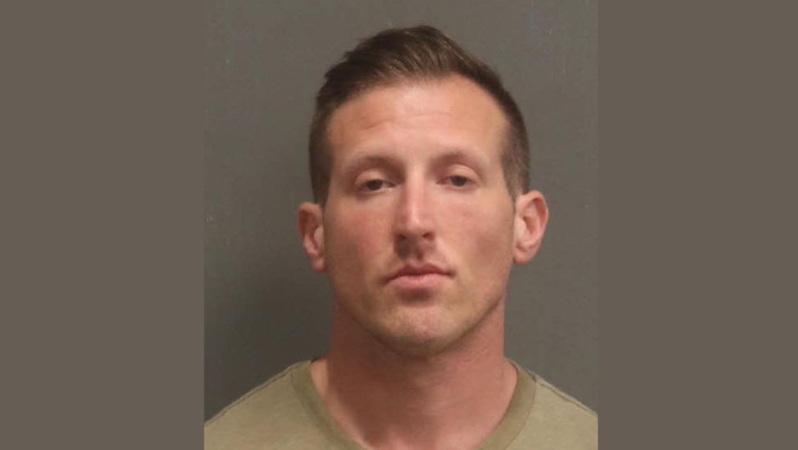Sean Herman Video Sparks and Police Accountability
Former Metro Nashville Police Officer Sean Herman became the center of a serious professional scandal after a video featuring him surfaced online. The footage, widely circulated on social media, showed Herman participating in a staged traffic stop while wearing his MNPD uniform. The video quickly drew widespread attention due to his inappropriate conduct during the skit.
In the video, Herman is seen groping the exposed breast of a female driver, a clear violation of both professional standards and public trust. The incident immediately raised concerns about the conduct of law enforcement officers and sparked swift action from authorities.

Upon verification of the video, the Metro Nashville Police Department acted decisively. Herman was arrested and relieved of his duties on May 9, reflecting the department’s zero-tolerance stance on misconduct. Subsequently, during a hearing by the Tennessee Peace Officer Standards and Training (POST) Commission, Herman’s POST certification was suspended indefinitely in response to the pending criminal charges against him. These measures highlighted the seriousness of his actions and the consequences for breaching professional ethics.
The controversy has not only resulted in Herman’s personal and professional downfall but also ignited broader discussions about accountability and ethical standards within law enforcement. Ongoing investigations and legal proceedings aim to address these issues and ensure that justice is upheld, preserving the integrity of the police force.
Contents
Incident Details and Video
The video depicted Herman in a staged traffic stop scenario, beginning as a routine encounter but escalating into inappropriate behavior. Clad in his official MNPD uniform, he was shown groping the exposed breast of the female driver, a blatant violation of ethical and professional boundaries.
Video and Unblurred for Everyone
Initially discovered through social media, the video quickly gained attention and was brought to the Metro Nashville Police Department. Authorities verified its authenticity by cross-referencing details such as officer schedules and locations, ultimately confirming Herman’s involvement.
Following confirmation, Herman faced immediate criminal charges, primarily for battery, underscoring the severity of his actions. The case emphasizes that such misconduct particularly by a law enforcement officer in uniform is both unprofessional and legally punishable, highlighting the critical importance of accountability and public trust in policing.
Immediate Consequences
The fallout from the release of the video was rapid and severe for Sean Herman. Once his involvement was confirmed, the Metro Nashville Police Department acted decisively. Herman was arrested on May 9, just days after the video surfaced, marking the start of a series of disciplinary and legal actions addressing his misconduct.
Shortly after his arrest, Herman was terminated from his position as a police officer. This dismissal reflected the department’s strict policies against serious breaches of conduct and its commitment to preserving the integrity of the force. The swift progression from verification to dismissal highlighted the department’s dedication to accountability and maintaining public trust.

The Metro Nashville Police Department publicly condemned Herman’s actions. A departmental spokesperson emphasized that his behavior was wholly incompatible with the values and standards expected of Nashville officers. This clear stance reinforced the department’s commitment to ethical conduct and served as a strong signal to both the public and its personnel that misconduct would not be tolerated.
Beyond the immediate response, the department initiated a review of internal protocols to prevent similar incidents in the future. This proactive approach underscored the broader implications of the case for policing standards and community relations, aiming to ensure that all officers understand professional boundaries and the serious consequences of violating them.
The swift and comprehensive consequences faced by Sean Herman serve as a stark reminder of the critical importance of professional integrity within law enforcement. By acting decisively, the Metro Nashville Police Department not only addressed the misconduct but also set a precedent for handling similar incidents, reinforcing the standards all officers are expected to uphold.
Legal and Professional Repercussions
The legal and professional consequences for Sean Herman were equally significant. The Tennessee Peace Officer Standards and Training (POST) Commission suspended his POST certification following a formal hearing regarding the video incident. This certification is a mandatory credential for law enforcement officers in Tennessee, granting them the legal authority to enforce the law. Its suspension effectively stripped Herman of his legal standing as a police officer, marking a major turning point in his career.
The hearing proceeded without Herman’s physical presence; however, an attorney representing both him and the Metro Nashville Police Department addressed the commission on his behalf. While direct testimony is often influential in such deliberations, the attorney ensured Herman’s defense was formally presented, covering the procedural and legal aspects of the case.
The POST Commission’s decision to suspend Herman’s certification indefinitely reflected a thorough evaluation of the misconduct and demonstrated a strong commitment to accountability. By taking this action, the commission sent a clear message about the severe consequences of violating public trust and professional standards. The suspension also served as a deterrent, reinforcing the expectation that all law enforcement officers must maintain the highest level of integrity in their conduct.
Pending Criminal Proceedings
The consequences of Sean Herman’s actions extend beyond professional disciplinary measures into the realm of criminal law. Herman is scheduled to appear in court on September 19 to face charges arising from his conduct in the video. Among the charges is battery, reflecting the serious nature of his behavior. This court date is not only significant for Herman personally but also for the broader community, representing a critical moment of accountability for a former law enforcement officer.
The indefinite suspension of Herman’s POST certification plays a central role in these proceedings. This measure is both punitive and regulatory, designed to protect the public and uphold legal standards for police conduct. With criminal charges pending, keeping his certification suspended ensures that he cannot return to a position of authority where similar misconduct might occur.

If convicted, Herman faces severe legal consequences, including potential incarceration and long-term limitations on his employment, particularly in roles that require trust or law enforcement authority. The proceedings will scrutinize his actions in detail, examining both the context and the implications of his conduct during the incident.
This case unfolds amid heightened public attention on police ethics and accountability. National conversations about law enforcement standards amplify the significance of this trial, which could influence public trust and inform policies regarding officer conduct both on and off duty.
The legal journey ahead presents Herman with substantial challenges. The combination of professional sanctions and criminal charges paints a comprehensive picture of the fallout from his misconduct, highlighting both immediate and lasting impacts on his career and life. As the court date approaches, the proceedings will be closely observed, not just for the verdict but also for the precedent it may set in handling similar cases.
Broader Impact
The Sean Herman incident has implications far beyond his individual consequences, affecting public trust in law enforcement itself. Trust between the community and police is essential for effective policing, cooperation, and public safety. When officers engage in behavior that violates ethical and professional standards, it erodes this trust and can foster a sense of betrayal among the community, undermining the ability of departments to operate effectively.
In response to incidents like this, law enforcement agencies including the Metro Nashville Police Department often review and revise policies to prevent recurrence. The Herman case may prompt the MNPD to implement stricter rules regarding on- and off-duty conduct, enhance supervision, and strengthen officer vetting and training programs. These measures are critical not only to prevent similar incidents but also to restore community confidence in the police force.
The department may also expand community engagement initiatives. By fostering open communication and soliciting public input on policy reforms, the MNPD can better align its practices with community expectations. Transparency and cooperation are essential to rebuilding trust and ensuring effective law enforcement.
The Herman case serves as a stark reminder of the importance of high ethical standards in policing. His involvement in an inappropriate video led to his arrest, the suspension of his POST certification, and widespread discussion about police misconduct. Beyond his personal repercussions, the incident has prompted a broader reassessment of policies within the MNPD aimed at tightening regulations and improving officer conduct.
This case highlights the delicate balance between officer autonomy and responsibility. Police officers carry the weight of public trust both on and off duty. Any actions that compromise this trust can have serious consequences not just for the individual officer but for the law enforcement community as a whole. It underscores the need for ongoing training, strong oversight, and a culture that prioritizes integrity and accountability.
Ultimately, maintaining public trust requires a consistent and transparent approach to addressing officer misconduct. How a department manages such incidents shapes community perceptions and confidence in law enforcement. Moving forward, it is essential for the MNPD and similar agencies to address misconduct decisively while proactively preventing future incidents, safeguarding both the integrity of the police force and its relationship with the public.
Daily News -Katie Price Dubai Photo Draws Attention From Fans
Pan Piano Video Leak Causes Online Drama and Debate
Christine Chubbuck Video and the Media Decisions
Prison Officer Wandsworth Video Leak on Social Media
Georgie Cooper Video Leak and the Internet’s Reaction
Yes King Original Video Leads the Meme Culture Movement
Rock Paper Scissors Yellow Dress Video Leak Sparks Frenzy

